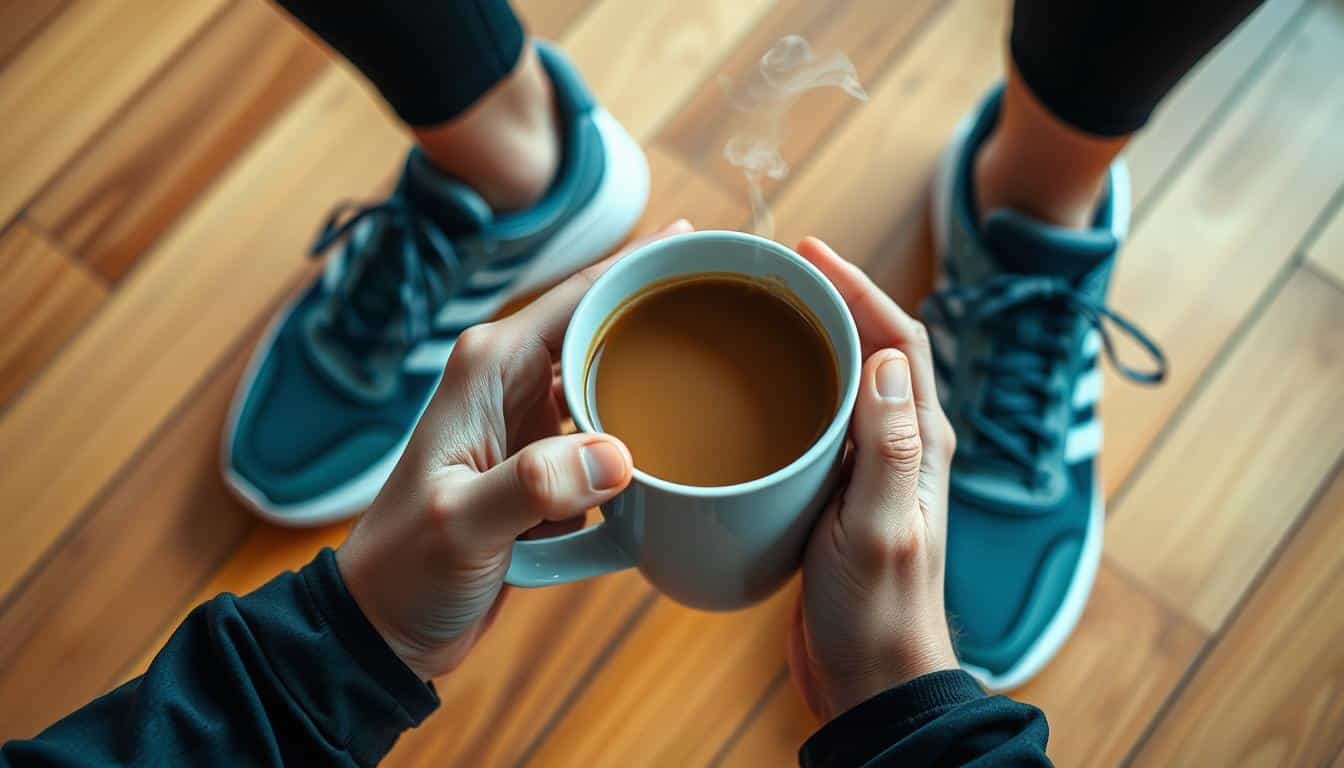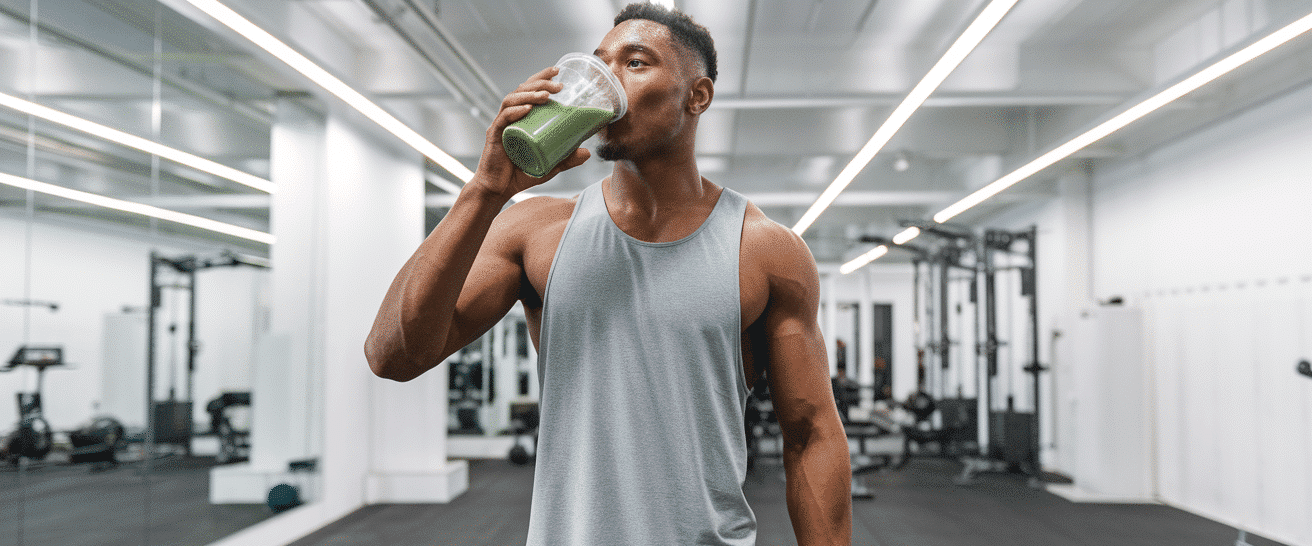Ever wondered if that cup of coffee before hitting the gym is helping or hurting your performance? You’re not alone. Over 65% of Americans consume caffeine daily, and many turn to it for an energy boost during exercise. But is it the right choice for you?
This article dives into the benefits and side effects of using caffeine before a workout. You’ll learn how it can enhance your performance, burn fat, and keep you energized. But we’ll also explore potential downsides like digestive issues or sleep disruption.
By the end, you’ll have the insights to decide if pre-exercise caffeine aligns with your fitness goals. Let’s get started!
Introduction to Caffeine and Exercise
What role does your daily brew play in your exercise routine? Caffeine is a natural stimulant found in coffee, tea, and even some snacks. It’s widely used across the globe, with 30-40% of people consuming it daily. But why does it matter for your workout?

A 2018 review found that consuming caffeine about 60 minutes before exercise can enhance explosive movements like jumps. This makes it a popular choice among athletes looking to boost their performance. However, not everyone reacts the same way. Your friend might handle espresso shots better than you.
Understanding how caffeine works can help you make informed choices for your fitness journey. In the next sections, we’ll break down exactly how that morning cup fuels your squats and other exercises. Stay tuned!
How Caffeine Affects the Body During Exercise
Ever wondered how your favorite pick-me-up impacts your gym session? Whether it’s coffee, tea, or a pre-workout drink, this stimulant can play a big role in your fitness routine. Let’s break down how it works during physical activity.

Impact on Energy Levels
One of the most noticeable effects is its ability to boost your energy. It works by blocking adenosine receptors in your brain, which delays the feeling of fatigue. This means you can push harder and longer during your exercise.
For example, that afternoon cup might just be the reason you crush your evening spin class. Studies show it can improve leg power by up to 5%, making it a favorite among athletes.
Influence on Mental Focus
It’s not just about physical energy. This stimulant also sharpens your mental focus. A 2018 review found it helps improve concentration during workouts, which is why many athletes rely on it.
Brazilian Jiu-Jitsu fighters, for instance, use about 3mg/kg to enhance their vertical jumps. However, remember that effects vary. What gives you focus might lead to jitters for someone else.
By understanding how it works, you can tailor your intake to match your fitness goals. Ready to learn more? Let’s dive into the benefits next.
Benefits of Caffeine Before Workouts
Ready to unlock new levels of energy and focus? Consuming this stimulant before physical activity can offer several benefits that enhance your fitness routine. From boosting strength to aiding in weight loss, let’s explore how it can help you achieve your goals.
Improved Physical Performance
One of the most notable benefits is its ability to enhance performance. Studies show it can increase leg power by up to 5%, making it a favorite among athletes. Whether you’re lifting weights or sprinting, this boost can help you push harder and achieve better results.
Increased Fat Burning
Looking to shed a few pounds? This stimulant can help. It boosts your metabolism, allowing a 154-pound person to burn an extra 100+ calories. Pair it with a banana for sustained energy, and you’ll have a winning combo for weight loss.
Reduced Muscle Pain
Ever feel sore after a tough session? This stimulant can help reduce perceived exertion, making high-intensity workouts feel more manageable. It’s a game-changer for those looking to recover faster and stay consistent with their training.
| Benefit | Impact | Example |
|---|---|---|
| Improved Performance | 5% leg power boost | Enhanced jumps and sprints |
| Increased Fat Burning | Extra 100+ calories burned | Supports weight loss goals |
| Reduced Muscle Pain | Lower perceived exertion | Easier recovery post-HIIT |
Cyclists, for example, maintain speed 12% longer when they consume it before a ride. These benefits make it a powerful tool for improving endurance and overall performance. Ready to give it a try?
Potential Drawbacks of Caffeine Before Workouts
Is that pre-exercise boost always a good idea? Let’s explore the flip side. While it can enhance performance, there are some side effects you should know about. From digestive discomfort to sleep troubles, here’s what to watch out for.
Upset Stomach and Digestive Issues
For some, it can lead to stomach cramps or discomfort. Studies show that 38% of users report digestive issues before lifting weights. Higher doses, like 9mg/kg, often cause these problems. If you’re sensitive, try cold brew—it’s less acidic and easier on the stomach.
Sleep Disruption and Anxiety
Timing matters. Consuming it in the afternoon can halve deep sleep phases, according to NIH studies. This can leave you feeling restless or anxious. If you’re prone to stress, consider cutting back or switching to decaf later in the day.
Increased Heart Rate and Blood Pressure
It can temporarily raise your heart rate and blood pressure. For example, 150mg can increase systolic BP by 8-10mmHg. While this is usually short-term, those with heart conditions should be cautious. Always monitor how your body reacts.
| Drawback | Impact | Solution |
|---|---|---|
| Digestive Issues | Stomach cramps, discomfort | Opt for cold brew or lower doses |
| Sleep Disruption | Reduced deep sleep, anxiety | Avoid afternoon consumption |
| Heart Rate Increase | Temporary BP and HR spikes | Monitor intake, consult a doctor |
While it can be a powerful tool, it’s not without its challenges. By understanding these side effects, you can make smarter choices for your fitness journey.
Caffeine Dosage and Timing for Optimal Results
Curious about how much caffeine you should take for better results? Getting the right amount and timing can make a big difference in your performance. Let’s break it down so you can fuel up effectively.
Recommended Dosage
Experts suggest consuming 3-6mg of caffeine per kilogram of your body weight. For example, a 70kg person would need 210-420mg, which is roughly 2-4 cups of coffee. Here’s a simple formula to calculate your dose:
- Your weight in pounds ÷ 2.2 × 3 = minimum effective dose.
- Start with 100mg (1 cup) and adjust weekly based on how you feel.
Using the FDA’s caffeine tracker app can help you avoid overdoing it. This ensures you stay within safe limits while still reaping the benefits.
Best Time to Consume Caffeine
Timing is key. For weightlifters, taking it 30 minutes before your session works best. Runners, on the other hand, should aim for 60 minutes prior. This gives your body enough time to absorb it and kick in during your workout.
Keep in mind, caffeine has a half-life of about 5 hours. Plan your intake accordingly to avoid disrupting your sleep. If you’re new to this, start small and gradually find what works for you.
By understanding the right doses and timing, you can optimize your energy levels and crush your fitness goals. Ready to give it a try?
Alternatives to Caffeine for Pre-Workout Energy
Looking for a way to fuel your workouts without relying on stimulants? You’re not alone. Many fitness enthusiasts seek natural and non-caffeinated options to boost their performance. Let’s explore some effective alternatives that can keep you energized and focused.
Natural Energy Sources
Food can be your best ally when it comes to sustained energy. Dates, for example, pack 31g of carbs per hour, making them a quick and healthy option. Pair them with nuts for a balanced snack that fuels your session.
Hydration is also key. Coconut water is a natural electrolyte powerhouse, often outperforming sports drinks. It’s refreshing, low in sugar, and helps replenish lost minerals during intense workouts.
Non-Caffeinated Supplements
If you’re into supplements, beta-alanine is a great choice. It reduces fatigue and enhances endurance, making it a favorite among athletes. Beetroot powder is another standout, increasing oxygen use by up to 20% for better performance.
For those who want a little fun, studies show that listening to loud music, especially metal, can boost your deadlift PRs. It’s a quirky but effective way to get pumped up!
| Option | Benefit | Best For |
|---|---|---|
| Dates | 31g carbs/hour energy boost | Sustained energy |
| Coconut Water | Natural electrolytes | Hydration |
| Beta-Alanine | Reduces fatigue | Endurance |
| Beetroot Powder | Increases oxygen use by 20% | Performance |
A word of caution: some supplements may contain hidden stimulants. Always read labels carefully to ensure they’re truly non-caffeinated. With these options, you can power up naturally and crush your fitness goals without the buzz.
Comparing Coffee to Commercial Pre-Workout Supplements
Coffee or pre-workout powders—which one’s better for your fitness routine? Both can give you the energy you need, but they come with their own pros and cons. Let’s dive into the details to help you decide.
Cost and Accessibility
When it comes to cost, coffee often wins. A monthly habit of brewing your own costs around $15, while pre-workout supplements can easily hit $50 or more. Even your $5 Starbucks habit beats the $3-per-serving price of many powders.
Accessibility is another win for coffee. You can grab a cup on the go, while pre-workouts require mixing and preparation. Cold brew, for example, packs 200mg of caffeine per 12oz—ready to fuel your session without the hassle.
Customization and Flavor
Flavor is where coffee shines. Add cinnamon, almond milk, or a dash of honey to customize your drink. Pre-workout supplements, on the other hand, often rely on artificial sweeteners and flavors that might not suit your taste.
Here’s an insider tip: Use leftover coffee in your protein shakes for a double boost of energy and flavor. It’s a simple way to get the best of both worlds.
Whether you choose coffee or pre-workout supplements, the key is finding what works for you. Consider your budget, taste preferences, and convenience to make the best choice for your fitness goals.
Who Should Avoid Caffeine Before Workouts?
Not everyone benefits from that extra energy boost before exercise. While many people rely on stimulants to enhance their performance, some individuals should steer clear. Understanding your body’s needs can help you make smarter choices for your fitness routine.
People with Caffeine Sensitivity
Did you know that 10% of the population has a slow metabolism gene (CYP1A2)? If you’re part of this group, even a small amount can leave you feeling jittery for hours. Symptoms like restlessness, rapid heart rate, and anxiety are common.
For slow metabolizers, it’s best to avoid stimulants altogether. Instead, try peppermint tea. It improves focus without the side effects, making it a great alternative for those with caffeine sensitivity.
Individuals with Certain Medical Conditions
If you have specific medical conditions, stimulants might do more harm than good. For example, those with hypertension risk dangerous blood pressure spikes. Similarly, people with arrhythmia, GERD, or panic disorders should avoid it.
Pregnant women are advised to limit their intake to less than 200mg daily, as recommended by OB/GYNs. Teens, especially college athletes, should also be cautious. The NCAA bans high doses to protect their health.
By understanding these red flags, you can tailor your pre-exercise routine to suit your needs. Always consult a healthcare professional if you’re unsure.
Conclusion
Wrapping up, let’s revisit the key takeaways about fueling your fitness routine. Studies show a dose of 3-6mg per kilogram of body weight, taken about 60 minutes prior, can enhance performance and boost fat burning by up to 27%. These benefits make it a popular choice for many athletes.
If you’re not sensitive to stimulants, try incorporating it into your routine for two weeks. Track your progress in a journal, noting timing and how you feel during each session. This helps you find what works best for you.
Remember, never exceed 400mg daily without consulting a doctor. While it can improve energy and focus, it’s essential to be mindful of potential side effects like jitters or sleep disruption.
Ready to share your experience? Join our Facebook group and tell us about your pre-exercise rituals. Let’s keep the conversation going and support each other in reaching our fitness goals!


